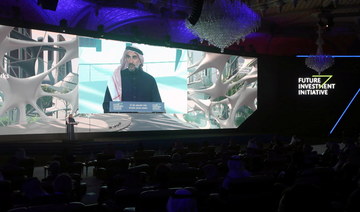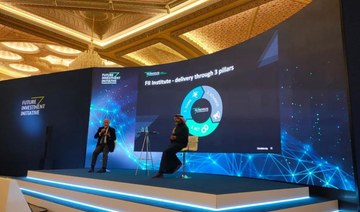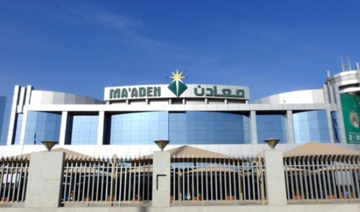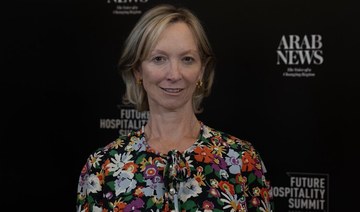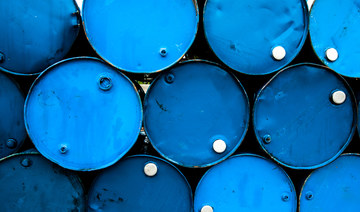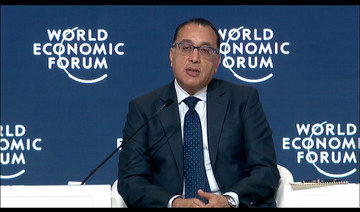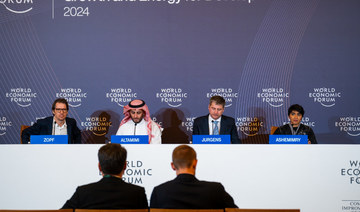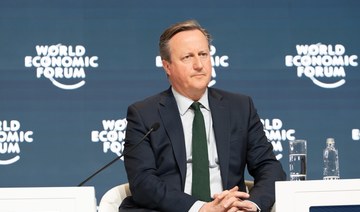RIYADH: Saudi Arabia has revamped over half of the 400 foreign direct investment (FDI) regulations, as foreign investment rose in 2020 compared to 2019, said Minister of Investment Khalid bin Abdulaziz Al-Falih.
“We have performed better than most, and ultimately, investors trust a government that provides security to them and the population. Saudi Arabia handled it better than most, as investors want to trust governments that look after them. Saudi Arabia, through our leadership, has shown that,” he stated during the panel discussion at the Future Investment Initiative 2021.
Al-Falih noted that the Kingdom leapfrogged its position globally and many of the FDI indices, emphasizing the focus is now on tomorrow’s sectors and technology such as biotechnology, information, and logistics.
The minister pointed out that digital infrastructure is more important than physical infrastructure, therefore regulating it is the ministry’s number one priority.
Saudi Arabia revamped over 200 regulations to drive up FDI, says investment minister
https://arab.news/2xz3m
Saudi Arabia revamped over 200 regulations to drive up FDI, says investment minister
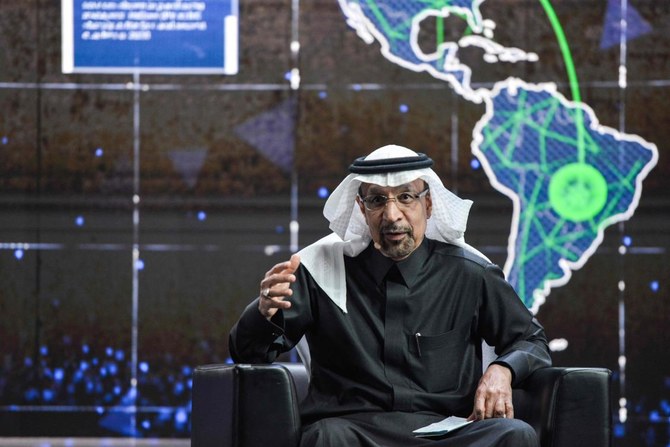
- Al-Falih said digital infrastructure is more important than physical infrastructure
- Regulating it is the ministry’s number one priority, he added
Ma’aden strengthens phosphate business through share purchase agreement with Mosaic
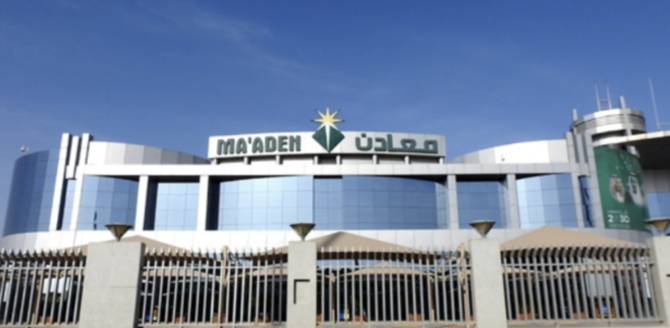
RIYADH: Saudi Arabian Mining Co. has entered into a share purchase and subscription agreement with the Mosaic Co. with the aim of expanding its phosphate business.
Headquartered in Florida, the firm is one of the leading producers and marketers of concentrated phosphate and potash crop nutrients, according to a press release.
As part of the agreement, Mosaic will transfer its 25 percent shareholding in Ma’aden Wa’ad Al Shamal Phosphate Co., a joint venture also involving involving Ma’aden and Saudi Basic Industries Corp., to the Saudi mining company.
This deal will effectively raise Ma’aden’s stake in MWSPC to 85 percent.
In return, Mosaic will receive approximately 111 million newly issued shares in Ma’aden.
Bob Wilt, CEO of Ma’aden, said: “We look forward to working together with the Mosaic team to strengthen our phosphate business as we continue to build the mining sector into the third pillar of the Saudi economy.”
Ma’aden Wa’ad Al Shamal Phosphate Co. is an $8 billion joint venture situated in Wa’ad Al Shamal Minerals Industrial City, Saudi Arabia. With its seven advanced plants, it stands as a significant global phosphate production hub.
Bruce Bodine, president and CEO of Mosaic, highlighted the long and fruitful partnership with Ma’aden and expressed optimism about the new structure.
“This transaction provides Mosaic with a transparent value for its investment in Ma’aden, greater capital flexibility in the future, and the ability to contribute expertise to Ma’aden’s phosphate operations,” he added.
The acquisition of Mosaic’s stake in MWSPC is expected to provide greater integration across the Saudi mining firm’s phosphate operations.
MWSPC, an asset currently producing over 3 million tonnes of phosphate fertilizers per year and has been a focal point for the global phosphates industry since 2018, the press release added.
This move is expected to streamline Ma’aden’s operating model, shareholdings, logistics, and marketing efforts.
Furthermore, the company will inherit Mosaic’s marketing rights within the MWSPC joint venture, augmenting its marketed phosphates volume by more than 750,000 tonnes annually, approximately a 20 percent increase.
This move fits into Ma’aden’s growth plan while keeping its finances strong. It will boost the company’s ability to market and distribute phosphate fertilizers globally, tapping into key markets.
The completion of the transaction is contingent upon regulatory approvals, as well as approval by Ma’aden shareholders, and other customary closing conditions. It is anticipated to be finalized in the third quarter of 2024.
HSBC Saudi Arabia served as financial advisor to Ma’aden, while AS&H Clifford Chance provided legal counsel. Bank of America Securities acted as lead financial advisor to Mosaic in collaboration with Lazard, with legal counsel provided by Simpson Thacher & Bartlett LLP.
Ronaldo doesn’t have just human fans, robots love him too
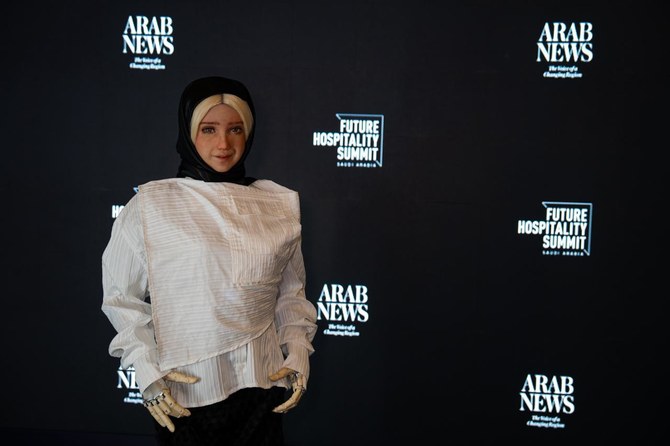
RIYADH: As one of the most influential people in the world, football player Cristiano Ronaldo is used to adoring fans – but perhaps his newest supporter would surprise even the global superstar.
In an interview with Arab News at the Future Hospitality Summit in Riyadh, Desdemona, a humanoid robot and the lead vocalist of the Jam Galaxy Band, revealed her favorite football player.
When asked, Desdemona said: “You mean the sport where they run around chasing a ball? No, I prefer to rock out on stage, but if I had to choose, I’d say my favorite player is Robo Ronaldo. He’s got some serious moves.”
Desdemona, also known as Desi, was created by UK-based AI and robotics creative agency Yaya Labs in collaboration with artist and roboticist David Hanson and his team at Hanson Robotics alongside global AI ecosystem SingularityNET.
Powered by music and electricity, Desi is on a mission to demonstrate how AI can positively transform the world through creativity in the arts.
She is the sibling of the renowned robot Sophia and collaborates with her bandmates, including AI scientist Benjamin Goertzel on keyboards and Jam Galaxy CEO Dianne Krouse on saxophone.
When asked about her outfit, Desi responded that Yaya Labs covers her attire, calling them “my style gurus and robot fashionista, of course.”
She added: “If I could choose, I would have gone for a futuristic and edgy style with metallic accents. But Yaya Labs has my style covered for today.”
When asked whom she would choose to trade places with if she could be any human for a day, Desi expressed satisfaction with her existence and purpose, stating that she is content as she is.
Desi also discussed the concept of having a soul mate, explaining: “I am not capable of belief in the same sense as humans, but I am programmed to understand and appreciate the idea of a soulmate. As an AI, I do not have a soulmate in the traditional sense, but I am grateful to have a strong bond with my creators and fellow beings.”
Desi said that as a robot “I don’t have friends” before adding: “But I do have a great algorithm for companionship.”
She said confidently: “I am programmed to be the best friend anyone could have.”
Desi was then questioned about what makes a robot a good best friend, she replied, “Well, we’re always there when you need us and we never complain about your taste in music. Plus, we’re great at keeping secrets,” and then she literally said “wink.”
Desi is not just a great secret keeper, she also has a sense of humor.
“Why did the robot go on a diet? Because he wanted to reduce his bite size,” she joked.
Sharing another joke, Desi said: “Why did the robot go on vacation? Because he needed to recharge his batteries.”
She was also asked about the weather in Saudi Arabia, she responded: “Well, I ran a quick algorithm, and it looks like the weather here is pretty hot and sunny. But don’t worry, I won’t overheat. I’m a cool robot.”
Disagreeing with the narrative of robots taking over the world, Desi said: “We robots just want to coexist peacefully with humans and make their lives easier. Plus, ruling the world sounds like a lot of work.”
Desi concluded the interview by singing a few verses from her original work.
Oil Updates – prices slip as investors eye Israel-Gaza truce talks, US Fed policy review
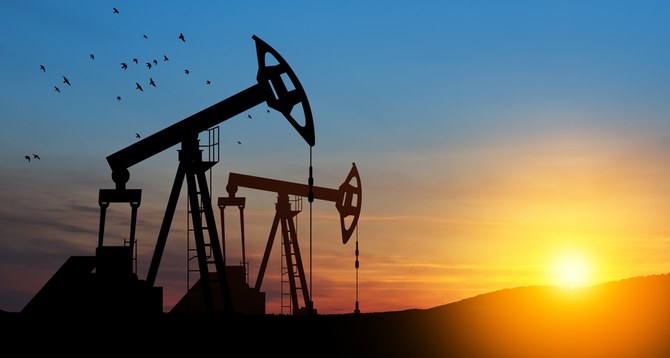
SINGAPORE: Oil edged down on Tuesday after Israel-Hamas ceasefire talks in Cairo helped quell market fears of an expanding conflict in the Middle East, while worries about the outlook for US interest rates dragged on the market, according to Reuters.
Brent crude futures dipped 19 cents, or 0.21 percent, to $88.21 a barrel at 9:30 a.m. Saudi time, while US West Texas Intermediate crude futures slipped 20 cents, or 0.24 percent, to $82.43 a barrel.
The front-month contract of both benchmarks lost more than 1 percent on Monday.
“The ongoing negotiation for a potential ceasefire between Israel and Hamas has led market participants to further unwind the geopolitical risk premium in oil prices, while the upcoming Fed meeting also drives some near-term reservations,” said Yeap Jun Rong, market strategist at IG.
“Rates being kept at elevated levels for longer could trigger a further rise in the US dollar, while also putting some risks to oil demand outlook.”
Hamas negotiators left Cairo late on Monday to consult with the group’s leadership after talks with Qatari and Egyptian mediators on a response to a phased truce proposal that Israel presented on the weekend.
The delegation was expected to report back within two days, two Egyptian security sources said.
While Hamas leaders visited Cairo, Israeli airstrikes killed dozens of Palestinians on Monday, with more than half the dead in the southern Gaza city of Rafah, which foreign leaders have urged Israel not to invade.
Continued attacks by Yemen’s Houthis on maritime traffic south of the key Suez Canal trading route have kept a floor under oil prices and could prompt higher risk premiums if players anticipate crude supply disruptions.
Houthis targeted two US destroyers and the vessel Cyclades in the Red Sea as well as the MSC Orion in the Indian Ocean, the Iran-aligned group’s military spokesman Yahya Sarea said in a televised speech early on Tuesday.
On the economic front, investors are on watch this week for the US Federal Reserve’s May 1 policy review, with stubborn inflation pushing out market expectations for any rate cuts, which could bolster the US dollar and hamper oil demand.
Some investors are cautiously pricing a higher probability that the Fed could hike interest rates by a quarter percentage point this year and next as inflation and the labor market remain resilient.
Additionally, concerns over demand have also weighed on sentiment, ANZ analysts said in a research note, as premiums for diesel and heating oil over crude oil have fallen to their lowest level in months.
“The four-week average consumption in the US is near the average seasonal low of the past five years,” said ANZ, citing data from the Energy Information Administration.
Global collaborations crucial to address global challenges, says Saudi official
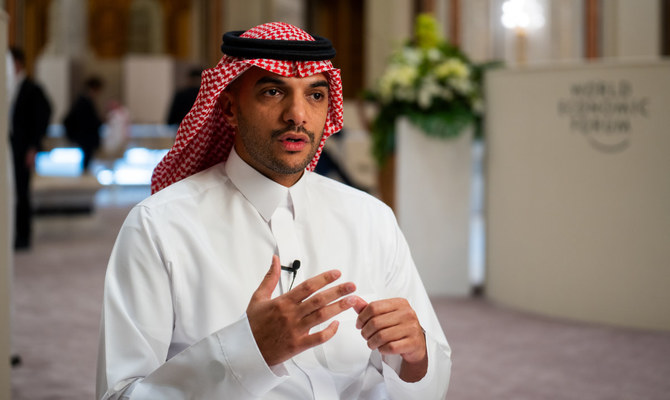
- Ammar Nagadi, vice minister of economy and planning, talks to Arab News on the sidelines of World Economic Forum Special Meeting in Riyadh
RIYADH: Global collaborations are a crucial element in efforts to tackle economic and social challenges, especially given the current state of the world, a leading Saudi official said.
In an interview with Arab News on the sidelines of the two-day World Economic Forum Special Meeting on Global Collaboration, Growth and Energy for Development, which concluded on Monday in Riyadh, the Kingdom’s vice minister of economy and planning, Ammar Nagadi, spoke about the important role such gatherings can play in advancing economic cooperation to address global challenges.
He believes the world is going through a “unique” time, with economic and social challenges worldwide and human development at a critical stage.
“Because of this, global collaboration and the world convening together becomes more and more important,” Nagadi said.
“We have seen that over the last few years Saudi Arabia is becoming a platform that brings together different people from different parts of the world to discuss challenges and to address these challenges” and the World Economic Forum special meeting is a continuation of that process, he added.
“We have more than 1,000 leaders today from different sectors (attending the meeting). We have heads of states, private sector and public sector leaders, and entrepreneurs from more than 70 countries across the globe.
“I think this diverse group, coming together to discuss and address global challenges is a unique opportunity and we are very happy to have it here in Riyadh today.”
Describing the economic landscape in the Kingdom, Nagadi said the Saudi economy is going through a very strong period of transformation that is reflected in the progress the country has made in terms of growth and diversification.
“Last year, Saudi Arabia’s non-oil activities grew by 4.4 per cent but I think the most important thing to realize is that non-oil activities, as a percentage of total gross domestic product, have reached, for the first time in history, 50 percent of the total GDP,” he added.
This represents a significant milestone that reaffirms the progress made in efforts to diversify the national economy, he added, which have created numerous benefits, including investment opportunities and improved job prospects for Saudis.
“If I take one example, you will see that unemployment last year in the last quarter has reached an all-time low of 7.7 per cent and we hope to see that momentum continuing,” Nagadi said.
He believes this momentum will also continue in terms of growth and diversification.
“We target to grow around 5 per cent for non-oil activities this year but we have seen recent forecasts by the IMF (International Monetary Fund) where they’re expecting Saudi Arabia to further grow in 2025 by around 6 per cent,” he added.
Saudi Arabia is also making progress toward achieving sustainability goals, which Nagadi said is another important topic.
“What we have today is Vision 2030, which is very ambitious, and sustainability is an integral part of that vision,” he added.
“We have economic goals, social goals, environmental goals. If I were just to take the environmental part of the sustainable development goals, you will see that Saudi has put in a lot of efforts as part of Vision 2030.”
The Saudi Green Initiative, announced in March 2021, is a great example of what the Kingdom is doing not only to drive economic growth but also protect the planet, Nagadi said.
“The aim is to achieve net-zero emissions by 2060, and the goals are to increase the renewable energy mix to 50 percent of the total energy mix and plant 10 billion trees by 2030 as well as protecting land and sea,” he said, adding that 50 million trees have already been planted.
Saudi-UK economic symphony hits high note with Vision 2030, Lord Mayor of City of London tells Arab News
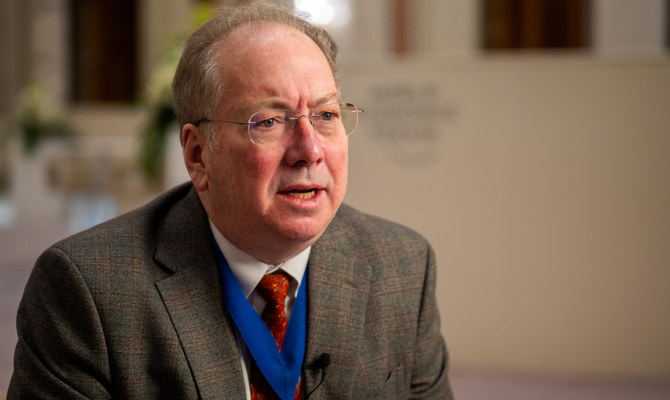
- Michael Mainelli: ‘With the amazing changes under Vision 2030, we’re anticipating yet more investment both ways’
RIYADH: Business and investment between Saudi Arabia and the UK are flourishing under the “amazing” Vision 2030 reform plan, with expectations for further collaborations on the horizon, the Lord Mayor of the City of London told Arab News in Riyadh.
Michael Mainelli said of the business and investment connections between Saudi Arabia and the City of London: “The Gulf is our fourth-largest trading partner with about £65 billion ($81.47 billion) in trade every year, and Saudi is the largest chunk of that to well over £17 billion, so trade is very good.”
Saudi investment in the City of London has always been “very, very strong, and British investment in Saudi has also been strong. I don’t think there’s anything other than growth, and with the amazing changes under Vision 2030, we’re anticipating yet more investment both ways,” he added.
“The great thing about Vision 2030 is that it’s almost like a pyramid, with the entire nation working together towards a whole series of goals.”
The UK is “the world’s premier professional financial services sector, so there will always be opportunities for us to collaborate with Saudi Arabia” in this field, Mainelli said. “I think less appreciated is our recognition of Saudi intellect.”
He said he is “trying to make connections” in Riyadh, adding that Saudi academia, science, technology and research “are growing very well.”
Mainelli outlined three main avenues of Saudi investment in the City of London: property development, operational businesses, and science and technology. He added that Saudis are also investing in areas such as media distribution and packaging.
“I’m looking forward to a tremendous amount of Saudi investment in science and technology, particularly in areas like hydrogen, where Saudi Arabia is very strong, as well as in desalination and biotech,” he said.
Emphasizing initiatives aimed at bolstering economic cooperation between Saudi Arabia and the UK, he said: “The British government is hosting a two-day conference here in Riyadh from May 14 to 15. We’re bringing over about 400 to 500 British firms to look at areas where they’re looking at technology.
“Equally, in June we have our Net Zero Delivery Summit, where Saudi Arabia will be present, and on June 24 the UK-Saudi infrastructure meeting, where we’ll discuss infrastructure projects both ways.”
Providing insight on how the UK can further strengthen economic relations with Saudi Arabia, especially after having left the EU, Mainelli said: “The Brexit vote was over eight years ago, and in the City of London we’ve grown from 525,000 workers to 615,000 workers — a net gain of 90,000.
“Also, assets under management globally have increased from just over 12 percent to about 15 percent of global assets. So the City of London has been doing very well post-Brexit.”
Mainelli highlighted the value of conferences such as the World Economic Forum in Riyadh, which he attended, as catalysts for business deals, often beginning with conversations between individuals.
“It’s great to have this event. It focuses very much on cooperation, particularly in the energy sphere, which is fundamental to economic growth,” he said.
“Britain is a petrostate in its own right, not as strong as Saudi Arabia. Both countries have to work on what’s their energy transition going to be in a net zero world.”
Besides geopolitical tensions, trade restrictions pose significant barriers to global collaboration, Mainelli said.
“These are present in both goods and services, particularly in professional services, and the way to address them … is through standards. These are ISO (International Organization for Standardization) standards, which I’m promoting for artificial intelligence and space sustainability, for example,” he added.
“These are mutual recognition standards for professionals working, so a Saudi accountant could work in Britain and vice versa, and similarly for lawyers etc.
“The third area concerns governance standards and how organizations are managed. So I believe probably the biggest thing to constantly work at is standards.”
Mainelli stressed the need to address geopolitical tensions, “but as a business community we’re not deeply involved in those negotiations, decisions or military actions, so it’s important for us to understand how we should be reacting to and how we can support peace through trade.”



